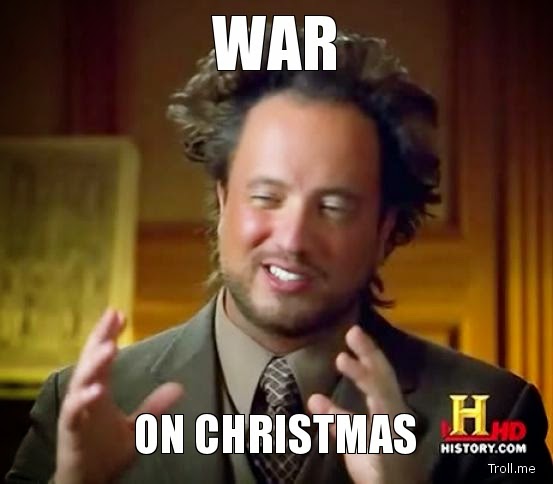In the essay “End the ‘War on
Christmas’” Edward Grinnan (p. 421) argues that the conflict known as “The War
on Christmas” is a foolish argument and a “ceasefire” should be declared over
the conflict. Grinnan argues that the holiday itself has roots in pagan culture
and was adapted into Christian culture in order to persuade those who lived in
their own society into joining Christianity. Also comparing the “War” to that
of a “bickering old married couple” that they are arguing about the topic
without any side reaching an agreement. Grinnan cites a story published in Guidepost regarding an incident on
Christmas Eve during World War I in which the opposing sides in the war spent
the night singing carols to one another instead of fighting only to resume
“killing each other” in the morning. Grinnan concludes saying that the argument
between religious and non-religious groups over the holiday is redundant since
it has “vaguely pagan origins” as well as pointing out the public’s over
“commercialization” of the holiday. Also explaining, that everyone should
embrace the “joy and light and peace,” that comes from celebrating the holiday
which is something we could all agree on.
The war on Christmas is fictional at
best considering the ever growing holiday season. In 2012 the holiday shopping
season started on Thanksgiving making it black Thursday instead of starting on
the traditional black Friday. The beginning of the holiday season has been the
Friday after thanksgiving since the mid 1900’s marking the official start with
sales in shopping centers as well as families beginning to trim their trees the
on this day. It is not commonly known to those who don’t work in retail but
most stores and shopping centers begin receiving holiday shipments as early as
mid-July to early August. Grinnan’s assessment about the over commercialization
of the holiday is correct because people have seen the holiday season as a way
to get the best deals on products that are generally expensive during the rest
of the year.
There is also the aspect of the
media’s and network television’s involvement by airing movies and specials
during the Christmas season. Television networks such as ABC Family air several
holiday specials as well as the highly publicized “25 Days of Christmas” when
they’ll air Christmas movies from the first of December until Christmas Day.
Networks rarely air specials for any other holiday during this season even
though Hanukah and Kwanza are a part of the season. Grinnan states that “the
separation between church and state can sometimes blur,” this is also something
that is addressed every year since the President and the White House have a
long standing tradition of their own holiday special that airs on cable
television every year. Even though the President shows support towards all
holidays it is widely known that the white house is mostly covered in Christmas
decorations during the season.
The constant argument of the so
called war on Christmas truly is fictional when just walking down New York
City’s infamous Fifth Avenue which is covered in decorations all the way down
to Rockefeller Plaza where the traditional Christmas tree is hung every
year. There’s even a big snowflake that
hangs on Fifth Avenue while men dressed in Santa suits stand at every corner
asking for Christmas donations. Grinnan’s assessment that “at its golden heart
Christmas is an embracing of joy and light and peace, something I think
everyone can agree to celebrate together” is true to most Americans who walk
through light covered streets and sing carols while sitting together at home
during the holiday. Yet the true question should be is there an actual war on
the holiday? Once a person looks around the real answer is no, the only war
that is being waged on Christmas is a war of words between opposing sides for a
greater equality for all other religions who don’t celebrate this mass marketed
holiday.
Works Cited

Comments
Post a Comment